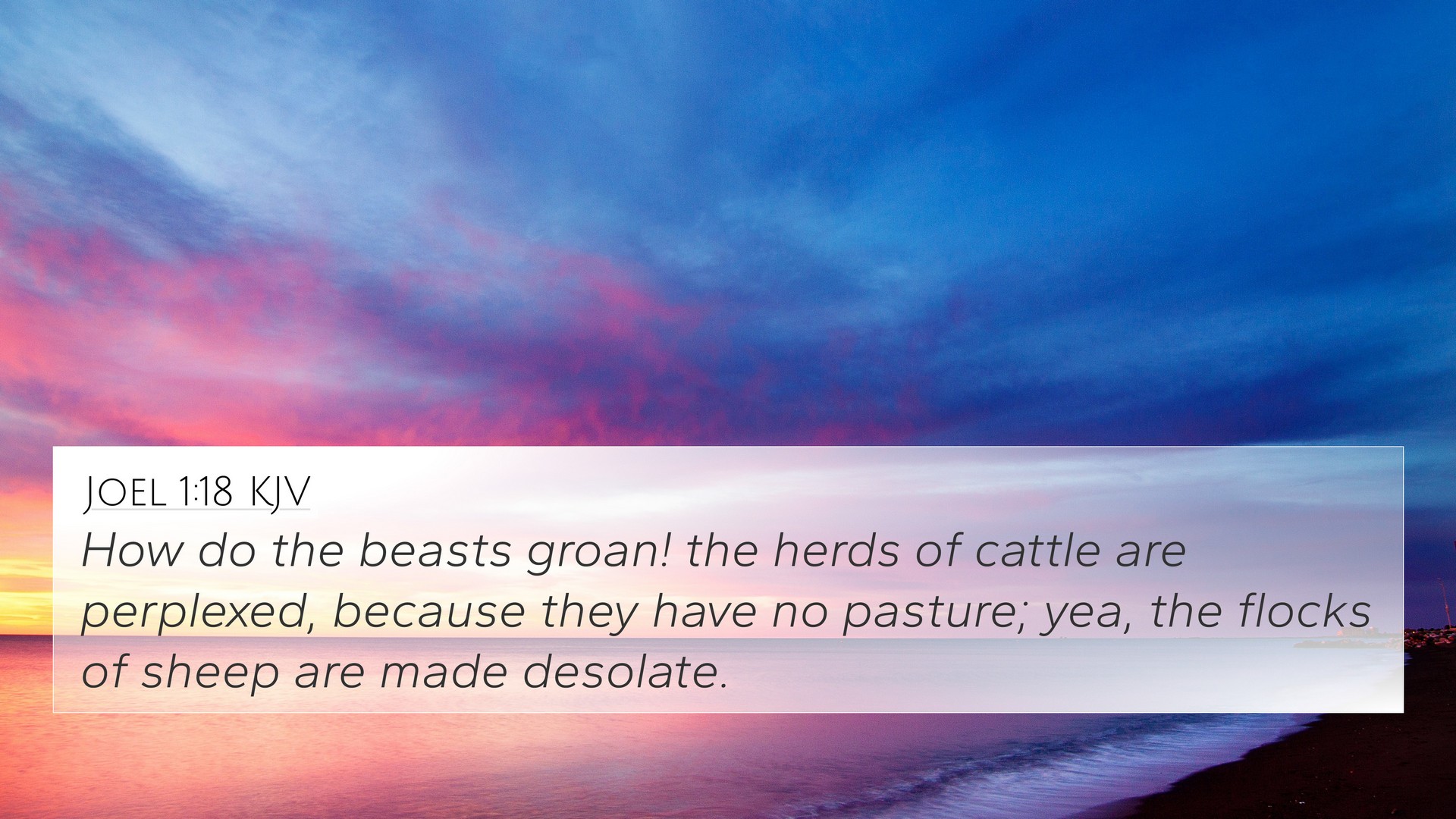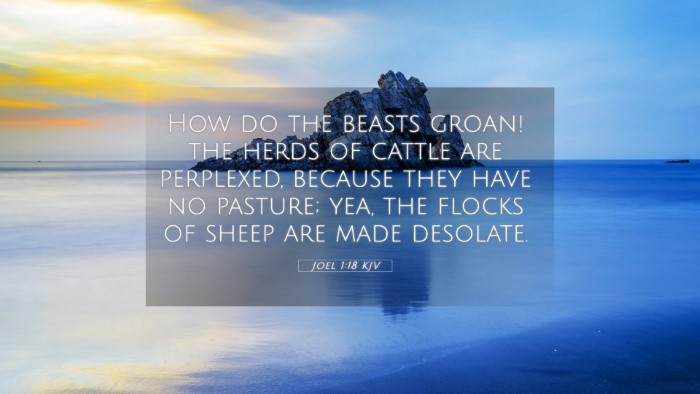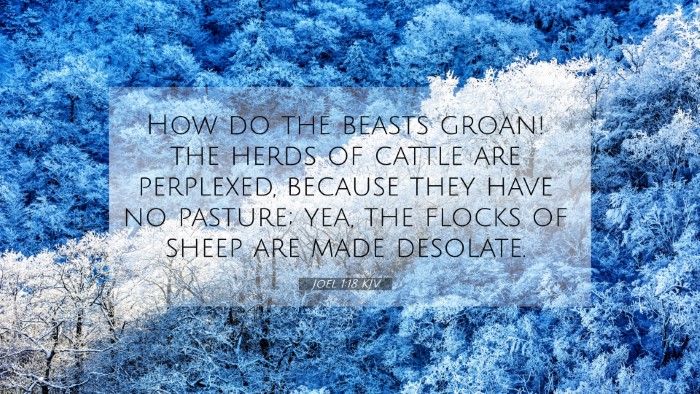Old Testament
Genesis Exodus Leviticus Numbers Deuteronomy Joshua Judges Ruth 1 Samuel 2 Samuel 1 Kings 2 Kings 1 Chronicles 2 Chronicles Ezra Nehemiah Esther Job Psalms Proverbs Ecclesiastes Song of Solomon Isaiah Jeremiah Lamentations Ezekiel Daniel Hosea Joel Amos Obadiah Jonah Micah Nahum Habakkuk Zephaniah Haggai Zechariah MalachiJoel 1:18 Similar Verses
Joel 1:18 Cross References
How do the beasts groan! the herds of cattle are perplexed, because they have no pasture; yea, the flocks of sheep are made desolate.
Uncover the Rich Themes and Topics of This Bible Verse
Listed below are the Bible themes associated with Joel 1:18. We invite you to explore each theme to gain deeper insights into the Scriptures.
Joel 1:18 Cross Reference Verses
This section features a detailed cross-reference designed to enrich your understanding of the Scriptures. Below, you will find carefully selected verses that echo the themes and teachings related to Joel 1:18 KJV. Click on any image to explore detailed analyses of related Bible verses and uncover deeper theological insights.
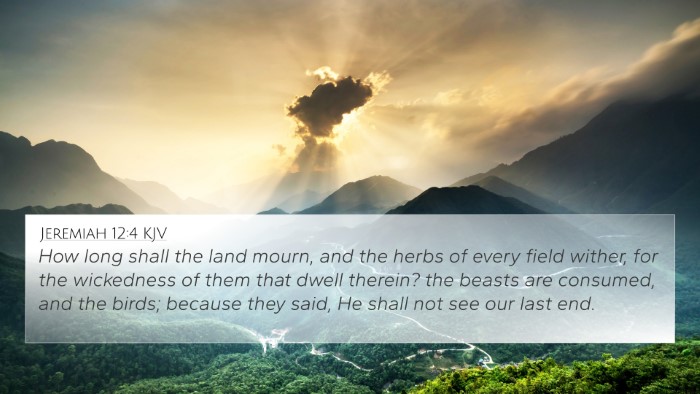
Jeremiah 12:4 (KJV) »
How long shall the land mourn, and the herbs of every field wither, for the wickedness of them that dwell therein? the beasts are consumed, and the birds; because they said, He shall not see our last end.
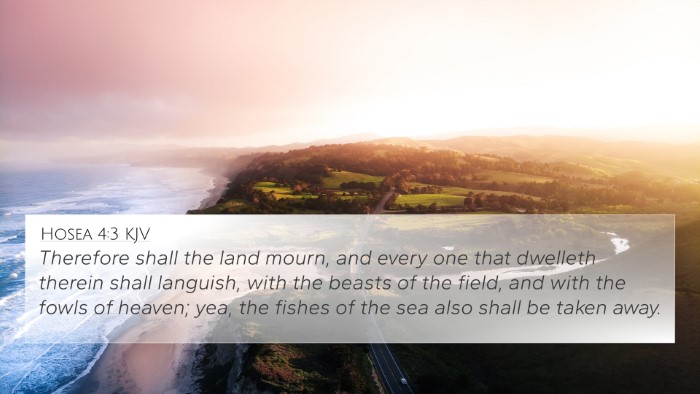
Hosea 4:3 (KJV) »
Therefore shall the land mourn, and every one that dwelleth therein shall languish, with the beasts of the field, and with the fowls of heaven; yea, the fishes of the sea also shall be taken away.
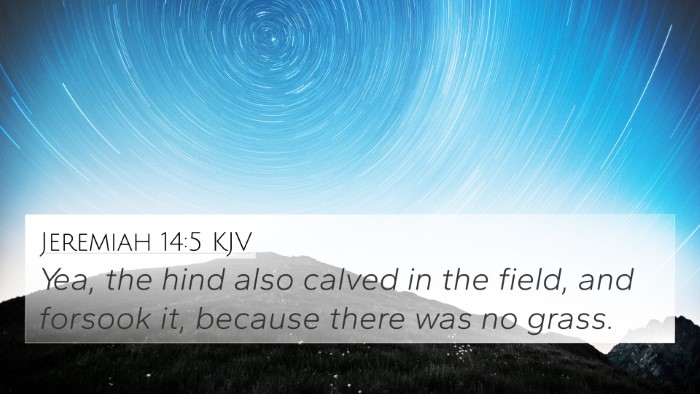
Jeremiah 14:5 (KJV) »
Yea, the hind also calved in the field, and forsook it, because there was no grass.
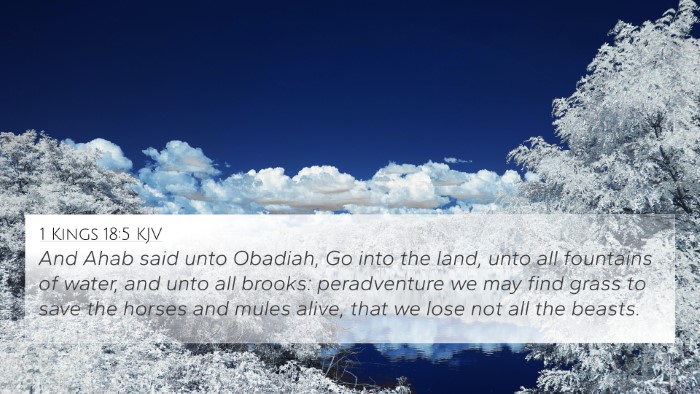
1 Kings 18:5 (KJV) »
And Ahab said unto Obadiah, Go into the land, unto all fountains of water, and unto all brooks: peradventure we may find grass to save the horses and mules alive, that we lose not all the beasts.
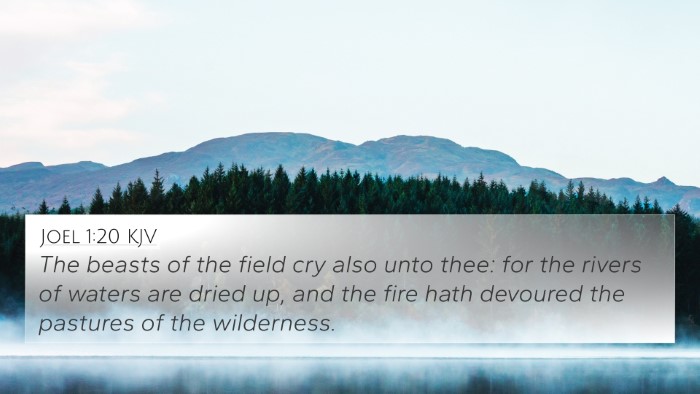
Joel 1:20 (KJV) »
The beasts of the field cry also unto thee: for the rivers of waters are dried up, and the fire hath devoured the pastures of the wilderness.
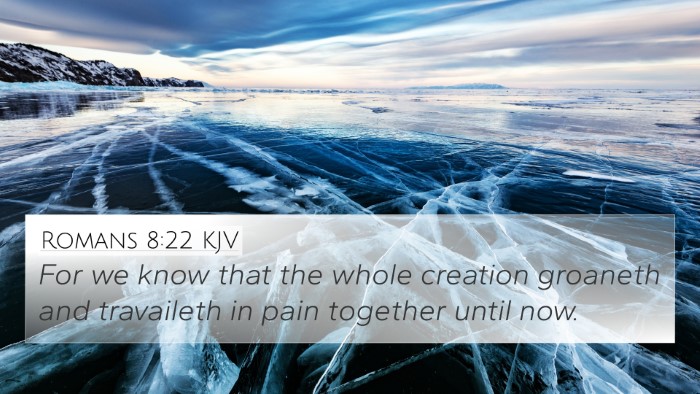
Romans 8:22 (KJV) »
For we know that the whole creation groaneth and travaileth in pain together until now.
Joel 1:18 Verse Analysis and Similar Verses
Understanding Joel 1:18
In the Book of Joel, the prophet brings forth a strong message regarding the devastation of the land, particularly highlighting the impact of a locust plague and the subsequent desolation. Joel 1:18 encapsulates this sense of mourning and concern for the state of the community. This verse reads: “How do the beasts groan! The herds of cattle are perplexed because they have no pasture; yea, the flocks of sheep are made desolate.”
Insights from Public Domain Commentaries
Here, we blend interpretations from notable commentaries to explore the depths of this verse and its theological implications.
Matthew Henry's Commentary Overview
Matthew Henry emphasizes the dire consequences faced by both humans and beasts due to the famine resulting from the locusts. He reflects on how the grief of the animals symbolizes the complete devastation spreading through the land, invoking a call for repentance among the people. Henry points out that when the beasts groan, it signifies the collapse of God’s provision and care for His creation.
Albert Barnes' Insight
Albert Barnes highlights the bewilderment of cattle amidst the famine. He explains that the lack of pasture leads to anguish not only in the animals but also in the communal life of Israel. For Barnes, this illustrates the interconnectedness of creation: everything is affected by sin and disobedience to God's covenant. The distress of the animals serves as a poignant reminder of God’s judgment as a consequence of unfaithfulness.
Adam Clarke's Interpretation
Adam Clarke focuses on the emotional fallout from the devastation. He notes that the cattle's perplexity indicates an absence of guidance and sustenance. Clarke draws connections between this verse and the broader theme of divine provision, asserting that when God withdraws His blessings due to human misconduct, the entire ecosystem suffers.
Literary and Thematic Connections
Joel 1:18 expresses a profound interconnectedness within creation, an idea that can be linked to other biblical texts.
- Psalms 36:6 - Reflects on God’s care for both man and beast.
- Proverbs 12:10 - Highlights the righteous care for animals.
- Romans 8:22 - Indicates that all creation groans under the weight of sin.
- Isaiah 1:3 - Suggests a lack of understanding in creation about God's provision.
- Lamentations 1:18 - Expresses sorrow over desolation and loss.
- Matthew 6:26 - Jesus speaks of God’s provision for birds, relating it to humans.
- Revelation 12:12 - Portrays the suffering that befalls creation due to the adversary.
Thematic Bible Verse Connections
The themes of desolation and repentance recur throughout the Scriptures, beckoning readers to a deeper understanding of God's plan for restoration. Such inter-Biblical dialogue encourages a comprehensive understanding of human responsibility toward creation. The emphasis on God’s judgment due to sin is echoed throughout both the biblical narratives and the apostolic teachings.
Exploring Cross-Referencing Biblical Texts
Understanding Joel 1:18 provides a gateway to exploring major themes within the scriptures, including divine justice, the mourning of creation, and the necessity of repentance. Utilizing tools for Bible cross-referencing can offer richer insights. Here are some methods and tips for effective cross-referencing:
- Use a Bible concordance to find related topics and themes.
- Employ a bible cross-reference guide to identify verse parallels.
- Utilize cross-reference Bible study to connect verses across both Testaments.
- Explore bible reference resources for finding scripture that resonates with similar themes.
Interpreting Biblical Themes through Cross-References
By engaging in comparative Bible verse analysis, one can carefully note the similarities and differences in how various texts address similar issues of suffering and divine justice. The connections between the Old and New Testament are profound, allowing for an enriched understanding of God's will through history.
Conclusion
Joel 1:18 serves as a powerful reminder of the interactions between humans and creation. The verse compels us to reflect on our own responsibility in preserving the earth and fulfilling God’s commands. This wealth of cross-references enriches the study, providing deeper insight into how scripture dialogues with itself. Thus, a careful examination of related verses paves the way for a greater appreciation of the holistic message of the Bible regarding justice, provision, and redemption.
